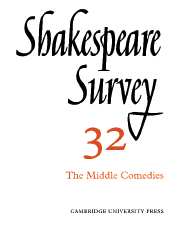Book contents
- Frontmatter
- Shakespeare’s Middle Comedies: A Generation of Criticism
- ‘Perfect Types of Womanhood’: Rosalind, Beatrice and Viola in Victorian Criticism and Performance
- The Stage Representation of the ‘Kill Claudio’ Sequence in Much Ado About Nothing
- As You Like It Adapted: Charles Johnson’s Love in a Forest
- Social Relations and the Social Order in Much Ado About Nothing
- Sexual Disguise in As You Like It and Twelfth Night
- Twelfth Night and the Myth of Echo and Narcissus
- ‘Smiling at grief’: Some Techniques of Comedy in Twelfth Night and Così Fan Tutte
- ‘My Lady’s a Catayan, we are politicians, Maluolios a Peg-a-ramsie’ (Twelfth Night II, iii, 77-8)
- The Importance of Being Marcade
- A Hebrew Source for The Merchant of Venice
- The Marriage Contracts in Measure for Measure: A Reconsideration
- Richard III: Antecedents of Clarence’s Dream
- Deep Plots and Indiscretions in ‘The Murder of Gonzago’
- ‘What is’t to leave betimes?’ Proverbs and Logic in Hamlet
- The Tempest: Language and Society
- Pictorial Evidence for a Possible Replica of the London Fortune Theatre in Gdansk
- A Year of Comedies: Stratford 1978
- The Year's Contributions to Shakespearian Study: 1 Critical Studies
- 2 Shakespeare’s Life, Times and Stage
- 3 Textual Studies
- Index
- Plate section
The Tempest: Language and Society
Published online by Cambridge University Press: 28 March 2007
- Frontmatter
- Shakespeare’s Middle Comedies: A Generation of Criticism
- ‘Perfect Types of Womanhood’: Rosalind, Beatrice and Viola in Victorian Criticism and Performance
- The Stage Representation of the ‘Kill Claudio’ Sequence in Much Ado About Nothing
- As You Like It Adapted: Charles Johnson’s Love in a Forest
- Social Relations and the Social Order in Much Ado About Nothing
- Sexual Disguise in As You Like It and Twelfth Night
- Twelfth Night and the Myth of Echo and Narcissus
- ‘Smiling at grief’: Some Techniques of Comedy in Twelfth Night and Così Fan Tutte
- ‘My Lady’s a Catayan, we are politicians, Maluolios a Peg-a-ramsie’ (Twelfth Night II, iii, 77-8)
- The Importance of Being Marcade
- A Hebrew Source for The Merchant of Venice
- The Marriage Contracts in Measure for Measure: A Reconsideration
- Richard III: Antecedents of Clarence’s Dream
- Deep Plots and Indiscretions in ‘The Murder of Gonzago’
- ‘What is’t to leave betimes?’ Proverbs and Logic in Hamlet
- The Tempest: Language and Society
- Pictorial Evidence for a Possible Replica of the London Fortune Theatre in Gdansk
- A Year of Comedies: Stratford 1978
- The Year's Contributions to Shakespearian Study: 1 Critical Studies
- 2 Shakespeare’s Life, Times and Stage
- 3 Textual Studies
- Index
- Plate section
Summary
'Where the devil/should he learn our language?' (II, ii, 66—7) wonders Stephano when he finds the terrified Caliban, echoing Ferdinand's first reply to Miranda:
My language? heavens!
(i, ii,429)Insignificant as this appears at first, it is new; never before in Shakespeare’s plays have characters called such attention to the fact that they might not speak the same language. Both Mortimer in 1 Henry IV and Henry V marry women of different tongues, but these ladies actually sing or speak on stage in their native languages, and the underscored confusion provides humor and charm. Elsewhere, dramatic license circumvents the difficulty, as Sicilians and Bohemians, Danes and Norwegians, Romans and Egyptians all converse, with our assent, in standard Elizabethan English. The Tempest, though, is different, and these two remarks are only one way in which Shakespeare calls attention to characters speaking. The question of language lies at the thematic center of The Tempest - a play where drops of water ‘swear’, thunder ‘pronounces’, and billows ‘speak’; a play where the controlling pulse derives ultimately from a magician’s arcane book. Shakespeare, in his final romance, returns with uncompromising directness to a problem which concerned him in earlier plays: the inescapable inadequacies of language as a medium for expression and communication. Like its characters, The Tempest demonstrates a heightened sensitivity to words, exploring these inadequacies and searching for a way to make language an acceptable basis for social order.
- Type
- Chapter
- Information
- Shakespeare Survey , pp. 177 - 188Publisher: Cambridge University PressPrint publication year: 1980

